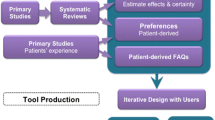Abstract
The increasing speed at which new knowledge is generated and disseminated means that we have to learn knew ways of handling this information. Instead of trying to remember information in case we need it at a later date, we need to develop the skills of finding, appraising and using information as and when we need it. This information may range from detailed research information to distilled systematic reviews and guidelines. Rapid access to reliable information in a usable form will change both the way professionals work and the way patients approach their doctor. The speed of access to clinical guidance for the doctor will need to be complemented by the opportunity to access the more detailed research information on which the guidance is based.
The sheer volume of information means that clinicians can never hope to stay ahead of patients. Instead, professionals will need to develop different relationships with the public and patients, guiding them through the task of finding and filtering information which is valid and relevant to that particular person. This changing relationship from paternalism to partnership in disease management should be accompanied by a spirit of openness. Only in this way can professionals develop a trusting and meaningful relationship with their patients, the crux of which is to share uncertainty in the doctor patient relationship without losing credibility or perceived value.
Similar content being viewed by others
References
Grimshaw J. Effect of clinical guidelines on medical practice: a systematic review of rigorous evaluations. Lancet 1993; 342: 1317–22
Grimshaw J, Russell I. Achieving health gain through clinical guidelines II: ensuring guidelines change clinical practice. Qual Health Care 1994; 3: 45–52
Haines A, Feder G. Guidance on guidelines. BMJ 1992; 305: 785–6
Editorial. Guidelines for doctors in the new world. Lancet 1992; 339: 1197–8
Hayward RSA, Wilson MD, Tunis SR, et al. More informative abstracts of articles on clinical practice guidelines. Qual Health Care 1994; 3: 123–32
Sheldon T. The good guide to guides. Health Service J 1994; 104: 34–5
Oxman AD, Sackett DL, Guyatt G. Users’ guides to the medical literature. I: How to get started. The Evidence-Based Medicine Working Group. JAMA 1993; 270: 2093–5
Effective health care: implementing clinical guidelines. Leeds: University of Leeds, 1994
Farmer A. Medical practice guidelines: lessons from the United States. BMJ 1993; 307: 313–7
Eccles M, Clapp Z, Grimshaw J, et al. North of England evidence based guidelines development project: methods of guideline development. BMJ 1996; 312: 760–1
Evidence-Based Medicine Working Group. Evidence-based care: 2. Setting guidelines: how should manage this problem? Can Med Assoc J 1994; 150: 1417–23
Hadorn DC, Baker D, Hodges JS, et al. Rating the quality of evidence for clinical practice guidelines. J Clin Epidemiol 1996; 49: 749–54
Cook DJ, Mulrow CD, Haynes RB. Systematic reviews: synthesis of best evidence for clinical decisions. Ann Intern Med 1997; 126(5): 376–80
Hibble A, Kanka D, Pencheon D, et al. Guidelines in general practice: the new Tower of Babel? BMJ 1998; 317: 862–3
Author information
Authors and Affiliations
Corresponding author
Rights and permissions
About this article
Cite this article
Pencheon, D. Guidelines for General Practitioners. Dis-Manage-Health-Outcomes 6, 59–63 (1999). https://doi.org/10.2165/00115677-199906020-00001
Published:
Issue Date:
DOI: https://doi.org/10.2165/00115677-199906020-00001




